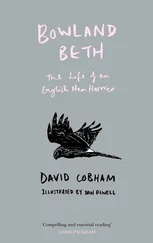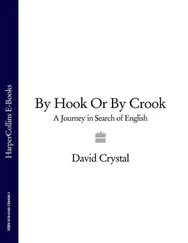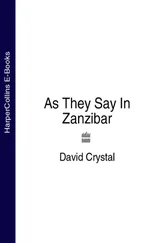Ain’t has had an unusual history. It’s a shortened form of several words — am not, are not, is not, has not and have not . It appears in written English in the 18th century in various plays and novels, first as an’t and then as ain’t . During the 19th century it was widely used in representations of regional dialect, especially Cockney speech in the UK, and became a distinctive feature of colloquial American English. But when we look at who is using the form in 19th-century novels, such as those by Dickens and Trollope, we find that the characters are often professional and upper-class. That’s unusual: to find a form simultaneously used at both ends of the social spectrum. Even as recently as 1907, in a commentary on society called The Social Fetich , Lady Agnes Grove was defending ain’t I as respectable upper-class colloquial speech — and condemning aren’t I !
She was in a rapidly diminishing minority. Prescriptive grammarians had taken against ain’t , and it would soon become universally condemned as a leading marker of uneducated usage. There was a chorus of criticism in 1961 when the editor of Webster’s Third New International Dictionary decided it was so widespread, even among cultivated speakers, that he could not possibly omit it. Rarely has a single word attracted such fury. But, as gotcha and other non-standard spellings illustrate, it’s by no means alone ( §88).
 62. Trek — a word from Africa (19th century)
62. Trek — a word from Africa (19th century)
In 1883, Olive Schreiner published a novel in London under the pseudonym of Ralph Iron. It was called The Story of an African Farm — a tale about a strong, independent-minded woman working on an isolated ostrich farm. The first novel to come out of South Africa, it became a bestseller.
While she was writing her book, Schreiner knew she had a problem. How was she to present the South African setting in an intelligible way? The opening lines of her story paint a picture of the countryside. It talks about karroo bushes, kopjes and sheep kraals . How would British readers know what she was talking about?
Her solution was to put a glossary of the most important words at the front of the book. There the reader would learn that the karroo was a ‘wide sandy plain’, a kopje was ‘a small hillock’ and a kraal was ‘the space surrounded by a stone wall or hedged with thorn branches, into which sheep or cattle are driven at night’. The words included animals ( meerkat , ‘a small weasel-like animal’), people ( predikant , ‘parson’), food ( bultong , ‘dried meat’), clothing ( kappje , ‘a sun-bonnet’) and various domestic objects and activities. Most of the words were of Afrikaans origin, but some were adaptations of British words. An upsitting , for instance, was a custom in Boer courtship: ‘the man and girl are supposed to sit up together the whole night.’
It was during the 19th century that words from Africa began to make an impact on English vocabulary. Previously, there had been very few. Yam and banana had arrived during the 16th century, and a few more followed, such as harmattan (a type of wind) and zebra . In South Africa, kraal appears in the 18th century, first in the sense of ‘village’, then in Schreiner’s sense of ‘animal enclosure’. Hundreds of words remained local to South Africa, such as bioscope (‘cinema’) and dorp (‘village’), along with borrowings from indigenous languages, such as maningi (‘very’) and induna (‘headman’). Several became part of standard English, such as commando, spoor and veld , as well as politically loaded terms such as resettlement and apartheid . But few have achieved such general usage as trek .
Trek arrived in the 1840s, meaning a journey by ox-wagon, very much associated with Boer movements in the region following the first ‘Great Trek’. It developed several senses in South African English and came to be used in a number of compounds, such as trek path (‘right of way’) and trek swarm (‘migrating honey bees’). But a century later, it was being used for any arduous overland journey in any part of the world. It became the perfect media word to describe dramatic explorations of jungles, deserts and ice caps.
Then trek went in a different direction. People began to use it for activities which, in Boer terms, would have seemed totally trivial. A boring or routine trip to the shops was called a trek . People trekked from home to their offices. Trekking holidays became popular, with trekkers warned to choose a level of physical commitment they could cope with. It didn’t even have to be a physical task. You could go on a mental trek , if you were going on an emotional journey or having difficulty thinking something out.
In the 1960s, there was an unpredictable development: a use developed with a capital T . Devotees of a new science fiction television series came to be called Trekkies or Trekkers (the choice was serious, as each name had its supporters and critics). In 1997 a documentary film about the fans was called Trekkies . The term began to be used beyond the series: anyone obsessed with fantasy space travel might be labelled a trekkie (with a small t ). Thanks to Star Trek , the word has regained its ‘long-distance’ meaning, boldly going where no loanword has gone before.
 63. Hello — progress through technology (19th century)
63. Hello — progress through technology (19th century)
It’s such a natural expression, used every day as a greeting. Surely this is one of those words which has been in the language for ever? In fact, its first recorded use is less than 200 years old.
English people have been using h -words to catch each other’s attention since Anglo-Saxon times. Hey and ho are recorded in the 13th century, and hi in the 15th. Hollo , hillo , holla , halloo and other shouts used in hunting are known from the 16th century, and are doubtless much older. For greetings, one of the words used by the Anglo-Saxons was hal (‘whole’, ‘healthy’) in such expressions as ‘be healthy’. Hail appeared in the 13th century. But we have to wait until the 19th century to see the modern greeting.
When it emerges, we find it in several spellings. All five vowels are used: hallo , hello , hillo, hollo and hullo . The variations arose because the stress in the word was on the second syllable, making it difficult to hear the quality of the vowel in the first. Today, hello is the usual spelling, about four times more common than hallo — except when authors are putting words into the mouths of policemen: Hallo, ’allo, ’allo says PC Palk, answering the phone in Agatha Christie’s The Body in the Library .
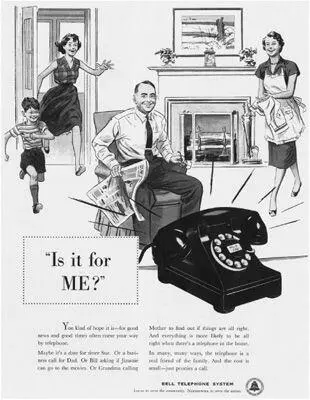
13. An early advertisement for Bell Telephones in the USA, emphasising the social role of the phone in a family context. When the telephone first arrived, there was a degree of concern that it might herald the end of traditional face-to-face social interaction. Ads like this one were intended to counter that scepticism.
Why did hello catch on? The word was around in the early 1800s, but used very informally, often as a part of street slang. The more formal usage seems to have emerged when the telephone was invented. People had to have a way of starting a conversation or letting the other person know they were there, especially if they were using a line where the connection was always open. Various forms were suggested, such as Ahoy! , Are you there? and Are you ready? , but Thomas Edison, the inventor of the telephone, evidently preferred Hello . This was the word he shouted into the mouthpiece of his device when he discovered a way of recording sound in 1877. And there is a famous letter which he wrote to a colleague about the telephone saying, ‘I do not think we shall need a call bell as Hello! can be heard 10 to 20 feet away.’ Within a decade, the women who were employed as the first telephone operators were being called hello girls .
Читать дальше
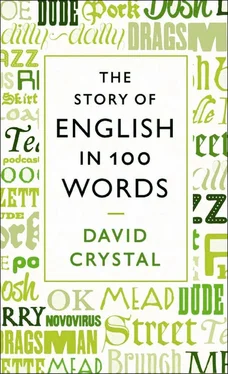
 62. Trek — a word from Africa (19th century)
62. Trek — a word from Africa (19th century) 63. Hello — progress through technology (19th century)
63. Hello — progress through technology (19th century)




